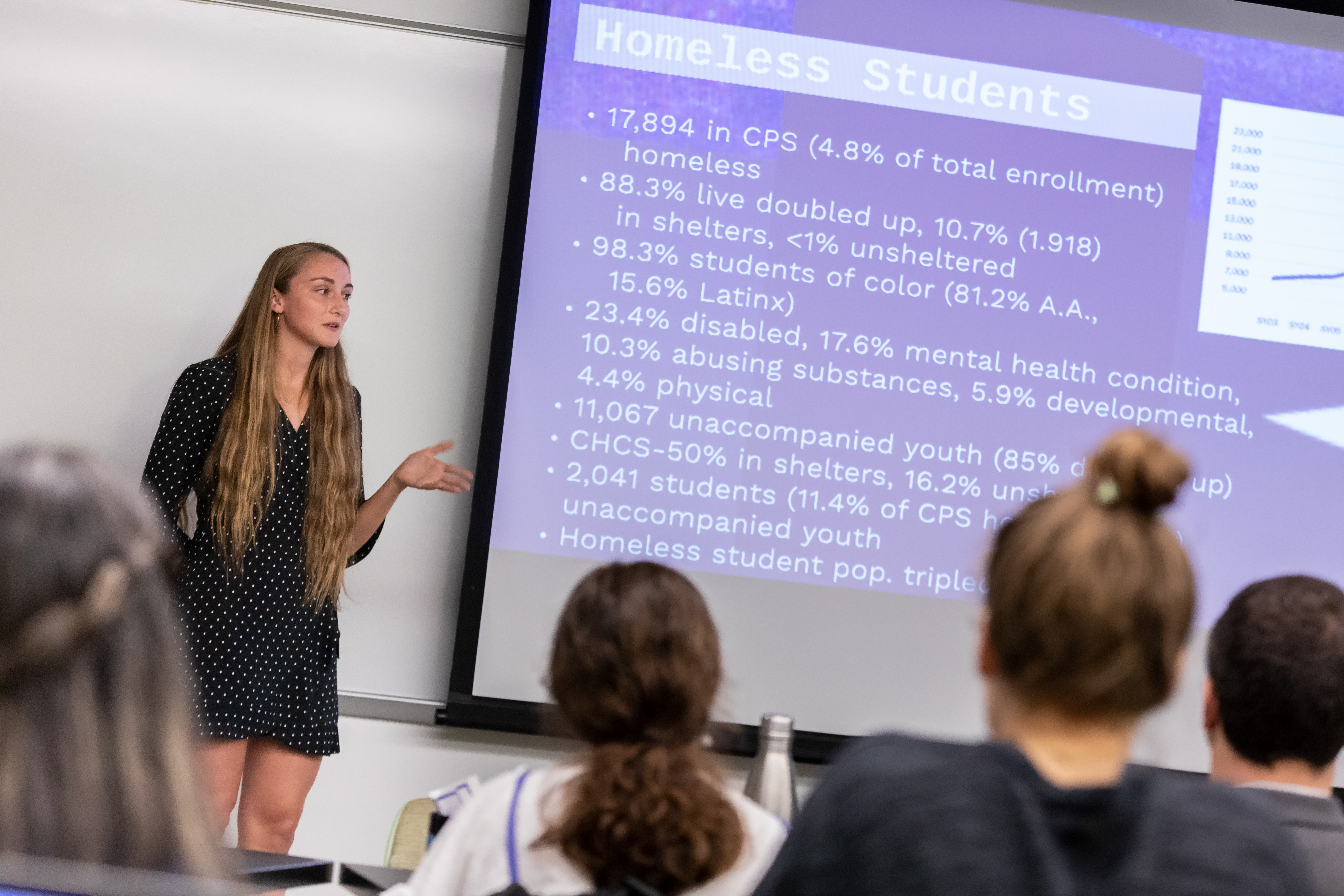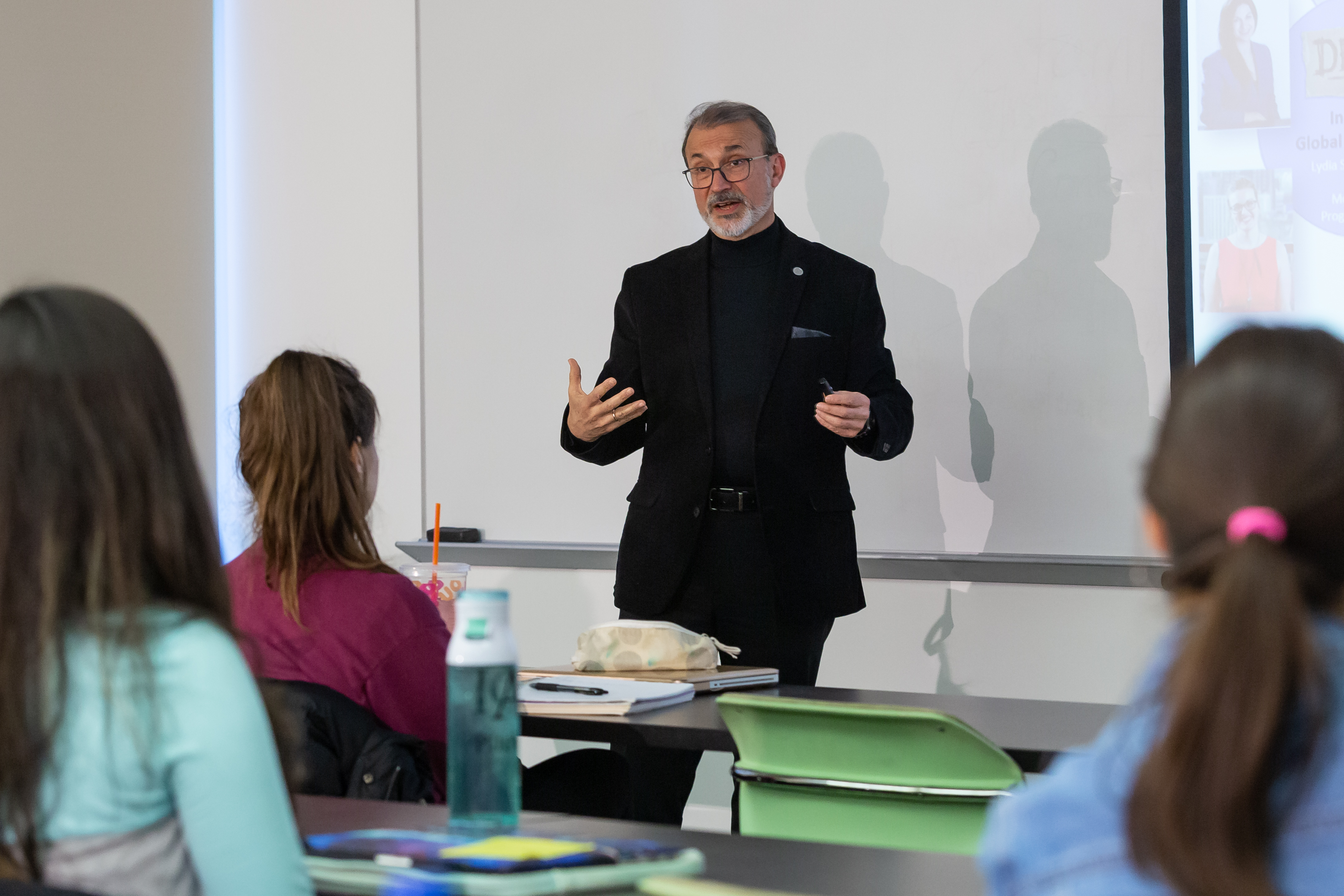 The final project for the honors course "Multidisciplinary Strategic Thinking for Wicked Problem: The Homelessness Case Study," involved groups of students presenting their ideas on how Chicago's homelessness problem could be solved. (DePaul University/Jeff Carrion)More than 86,000 Chicagoans were homeless in 2017, according to an estimate from the Chicago Coalition for the Homeless. The number is staggering and how to fix the problem is a question asked by many. One DePaul course last spring evoked the university’s namesake — St. Vincent de Paul — in asking “what must be done” to help the university community play a greater role in addressing this issue.
The final project for the honors course "Multidisciplinary Strategic Thinking for Wicked Problem: The Homelessness Case Study," involved groups of students presenting their ideas on how Chicago's homelessness problem could be solved. (DePaul University/Jeff Carrion)More than 86,000 Chicagoans were homeless in 2017, according to an estimate from the Chicago Coalition for the Homeless. The number is staggering and how to fix the problem is a question asked by many. One DePaul course last spring evoked the university’s namesake — St. Vincent de Paul — in asking “what must be done” to help the university community play a greater role in addressing this issue.
The brainchild of Guillermo Vásquez de Velasco, dean of the College of Liberal Arts and Social Sciences, “Multidisciplinary Strategic Thinking for Wicked Problem: The Homelessness Case Study,” examined how critical, systems and design thinking might be used to take a second look at complex societal problems like homelessness.
The 20 students who signed up for the class came from six of DePaul’s 10 colleges with 18 different majors ranging from animation to accountancy to Arabic studies.
"Homelessness was described as a 'wicked problem' in the course description because its multidisciplinary complexity makes it not only systemic, but also fluid," Vásquez de Velasco says. "'Wicked problems' are difficult to address and certainly not within the field of a specific discipline. There are problems and situations where we need to pool the knowledge base and skillsets of many professionals with many areas of expertise.”
 Guillermo Vásquez de Velasco, dean of the College of Liberal Arts and Social Sciences, played a key role in putting together the honors class “Multidisciplinary Strategic Thinking for Wicked Problem: The Homelessness Case Study.” (DePaul University/Katie Donovan)
Guillermo Vásquez de Velasco, dean of the College of Liberal Arts and Social Sciences, played a key role in putting together the honors class “Multidisciplinary Strategic Thinking for Wicked Problem: The Homelessness Case Study.” (DePaul University/Katie Donovan)To help shape the multidisciplinary approach to the homelessness discussion, Vásquez de Velasco recruited all of his fellow DePaul deans to lead a class discussion. Each dean led a class during the 11-week course, bringing his or her own areas of expertise to the classroom discussion.
During the fourth class, John Culbert, dean of The Theatre School, led a discussion on how theatre can create change, offer healing and humanize. The students were assigned to read a play about homeless youth, “Polaroid Stories,” by Naomi Iizuka.
“I think theatre can assist in addressing homelessness in a few ways,” Culbert says. “It can give voice to those who do not typically have one. For example, ‘Polaroid Stories’ is based on interviews with homeless youth — their story is not likely to be told in other ways. Telling the stories builds empathy and exposes others, who are not homeless, to the issue. Hopefully they are then inspired to do something about it — big or small in scale — depending on their role in the world.”
According to Culbert, examples of plays that have made a difference societally include “Hamilton,” by Lin-Manuel Miranda, and “Angels in America,” by Tony Kushner, which helped bring the issue of AIDS to the forefront of public awareness.
In addition to the deans, the students received assistance from Nancy Grossman, the associate director of DePaul’s honors program; Lydia Stazen, the director of DePaul’s Institute of Global Homelessness; Molly Seeley, the program manager of IGH; and Abe Morris, a former director of Depaul USA’s Dax Program.
At the beginning of the course, IGH and DePaul USA helped frame the problem of homelessness in Chicago. They also provided international cities that have created policy around the issue of homelessness for student groups to use as case studies. These cities were Medicine Hat, Canada; London; Tshwane, South Africa; Delhi; and Helsinki.
“Medicine Hat is the first city to claim it solved the issue of homelessness,” says Allison Moser, a senior studying political science. “However, I learned it could be incredibly difficult to compare various cities’ solutions to ending homelessness because the cities themselves can be so different from each other. We also learned how data can easily be skewed to make it seem like a city has ended homelessness.”
Niloo El-Maissi, also a senior political science major, studied Delhi and learned the city struggles to gain an accurate count on its homeless population.
“I learned how important it is to have a solid understanding of the demographics of any given homeless population in order to effectively implement beneficial policies and programs,” El-Maissi says.
The final project asked each group to apply what they learned from their international city case study toward a potential solution for Chicago. Several project ideas focused on a “housing first” model, which provides permanent housing first to those experiencing homelessness as a springboard to then begin addressing other issues like joblessness, substance abuse and balancing a budget.
“By ending an individual's homelessness first, they will gain the ability to pursue a variety of personal goals to enhance the overall quality of their life,” El-Maissi says.
Other projects looked at steps to prevent youth homelessness in Chicago, identifying and refurbishing vacant buildings owned by the city, or incentivizing Chicago businesses to play a role in stopping homelessness.
Vásquez de Velasco hopes the class can become a yearly occurrence, with the topic changing to problem-solving “wicked” issues like gun violence or climate change.
“Courses like this help us promote both the model of project-based learning and collaboration between our different colleges,” he says. “We talk about the importance of collaboration, but academic silos get in the way. We cannot address ‘wicked problems’ from a disciplinary perspective, it has to be multidisciplinary. Having all the deans of a university teach together is unprecedented and is evidence that at DePaul we can bridge between our silos, we can collaborate and, most importantly, we can teach to collaborate.”